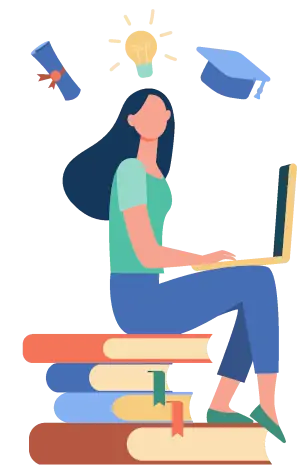Free online coursesBasic studies
Enhance your skills with our 133 free online courses in Basic Studies, covering subjects like Algebra, Geometry, Calculus, and more. Dive into topics such as Statistics, Trigonometry, and Geography. Explore History, Biology, Chemistry, and Physics, or delve into Economics, Literature, and Philosophy. Receive free digital certificates upon completion of each course, boosting your knowledge and credentials.
133 free online courses

Free online courses by area
Physics
22 courses
Algebra
16 courses
Biology
9 courses
Logical Reasoning
6 courses
Statistics
11 courses
Chemistry
8 courses
Calculus
11 courses
Geography
12 courses
Philosophy
3 courses
Trigonometry
7 courses
Literature
5 courses
Geometry
9 courses
History
5 courses
Economics
6 courses
Sociology
3 courses
🔬 Dive into Physics: From Fundamentals to Quantum Mysteries

Free Course
Fundamentals of Physics
28h44m
23 exercises

Free Course
Introduction to Thermodynamics
1h48m
9 exercises

Free Course
Quantum Physics
24m
4 exercises

Free Course
Magnets, Magnetism and Charges
New course
3h21m
21 exercises

Free Course
Astrophysics and Cosmology Course
1h24m
5 exercises

Free Ebook + Audiobook
The Physics of Time Travel: Theory and Possibilities

Best free video courses
📚 Algebra Mastery: From Basics to Advanced Geometry

Free Course
Linear algebra
27h55m
35 exercises

Free Course
Prealgebra
38h54m
44 exercises

Free Course
College Algebra Full Course
New course
6h43m
6 exercises

Free Course
Algebraic Topology
New course
24h03m
6 exercises

Free Course
Advanced Linear Algebra
New course
23h01m
30 exercises

Free Course
Algebraic geometry
New course
10h43m
58 exercises
Free Ebook + Audiobooks! Learn by listening or reading!

Complete Biology course for exams
91 pages

Comprehensive Mathematics Course for Exams
70 pages

Complete Chemistry course for exams
67 pages

Complete Manual of Perfect Writing
40 pages

The Physics of Time Travel: Theory and Possibilities
New course
21 pages

Electromagnetism Unveiled: From Basics to Modern Technologies
New course
22 pages
🌱 Biology Basics and Beyond: Journey into Life Sciences
Download the App now to have access to + 3300 free courses, exercises, certificates and lots of content without paying anything!
-
100% free online courses from start to finish
Thousands of online courses in video, ebooks and audiobooks.
-
More than 48 thousand free exercises
To test your knowledge during online courses
-
Valid free Digital Certificate with QR Code
Generated directly from your cell phone's photo gallery and sent to your email

Download our app via QR Code or the links below::.

Related articles
+ Read more about Basic studies
A Journey Through Ancient Egypt: Discovering the Land of the Pharaohs
Explore Ancient Egypt’s pyramids, pharaohs, and Nile River in this journey through one of history’s most fascinating civilizations.

Meet the Vikings: Adventurous Explorers From the North
Discover the world of the Vikings—brave explorers, skilled traders, and storytellers who shaped history across seas and continents.

The Amazing World of Ancient Rome: Life in the Eternal City
Discover daily life in Ancient Rome—families, food, schools, games, and innovations that shaped history in the Eternal City.

The Mystery of the Mayans: Ancient Cities in the Jungle
Discover the fascinating world of the Mayans—ancient cities, advanced knowledge, and enduring mysteries hidden in the jungle.

An Introduction to Nuclear Physics: The Science of the Atomic Nucleus
Discover the fundamentals of nuclear physics, exploring atomic nuclei, forces, applications, and experiments that reveal the building blocks of matter.

Exploring Nuclear Forces: The Glue of the Atomic Nucleus
Discover how nuclear forces hold the atomic nucleus together, influencing stability, energy, medicine, and scientific innovation.

The Role of Nuclear Reactions in Everyday Life
Discover how nuclear reactions impact daily life, from energy and medicine to archaeology, industry, and the future of sustainable nuclear physics.

Understanding Nuclear Decay: How Unstable Nuclei Transform
Explore nuclear decay, the process where unstable nuclei emit radiation to reach stability, and learn its types, applications, and safety considerations.

About
Free Certificate
After completing the course you will have free access to the digital certificate of course completion.
How to get it for free: It is only possible to issue the certificate in our application, which can be downloaded from Google Play or App Store, so you can take the online course here and use the app only to issue the certificate. Being that you can also take the courses through the app if you wish.
In digital format: After completing the course and generating the certificate through the application, the image of the same will be generated in the photo gallery of your cell phone and will also be sent to your email.
Why the certificate is important: You can use it to improve your resume, to rise in careers or positions, to enrich your knowledge and among several other applications.
See more about the Certificate



















What are people saying about free online courses of Basic studies
Dev Lekhwani
Good course for understanding Macroeconomics deeply
CoursePrinciples of Macroeconomics
Abshir Maxamed
real I'm happy to join Cursa online Courses
CourseLinear algebra
Rodney Rodrigo Medina Prieto
Excelente curso. Me encanta se profundiza muy bien el curso y está estructurado en extraordinario. ❤️
CourseIntroduction to Theory of Literature
Kagisho Andries Mothobi
I did enjoy the course, and it really makes a huge difference in my life. Thank you so much for bringing such a momentous course.
CoursePhysical Geography
Leopold Kossack
I loved it. I learned so much about Physics.
CourseCollege Physics 1
Sayan Bagui
Thank you for the exceptional course on chemistry. Professor Drennan’s engaging teaching style and dedication made.
CoursePrinciples of Chemical Science
Abdiwali Hersi Ali
when it reaches equilibrium, the teacher didn't flow a sequence steps, though it explanation is pretty well, this course is effective!
CourseChemistry
Safia Khalil Rahman
a very good video and use full full of education
CourseWorld Regional Geography
Curtis Ratcliff jr
can you get a job out of the certificate out of the world
CourseIntroductory Biology
Reena Smita Ekka
It was fruitful and helpful in my teaching..
CourseIntroductory Sociology